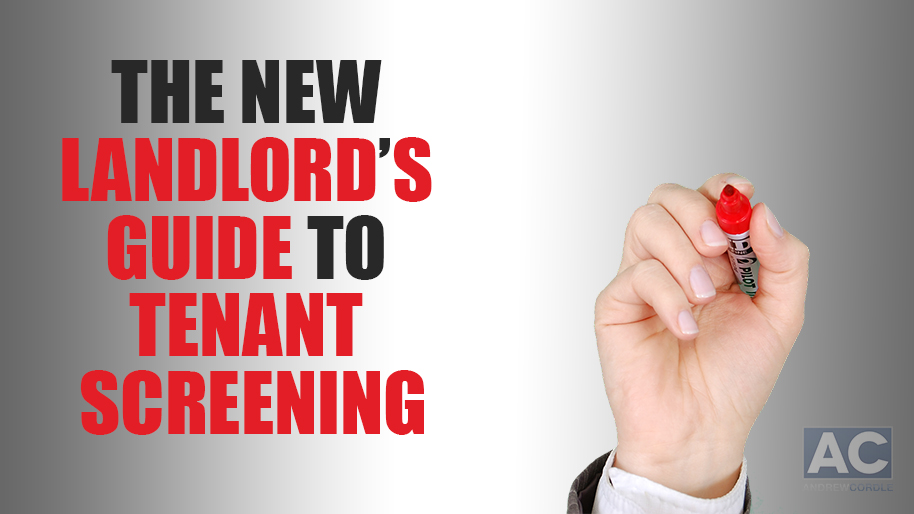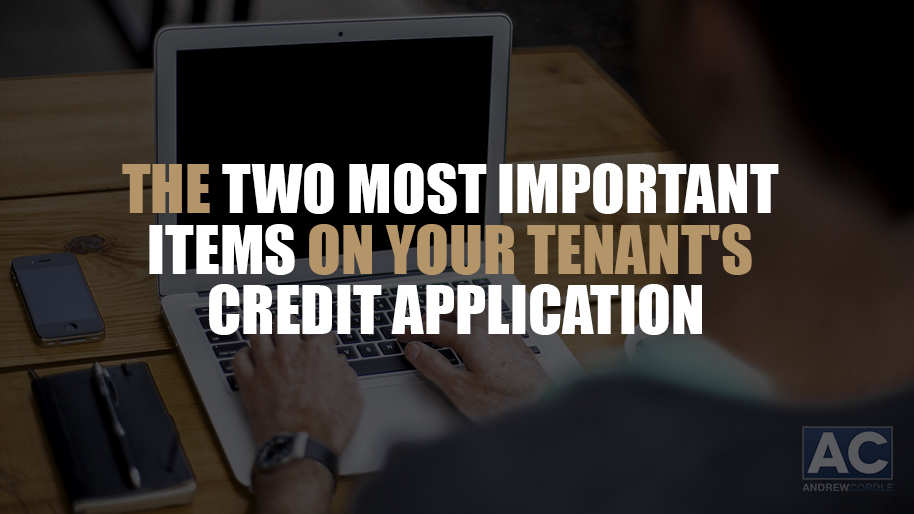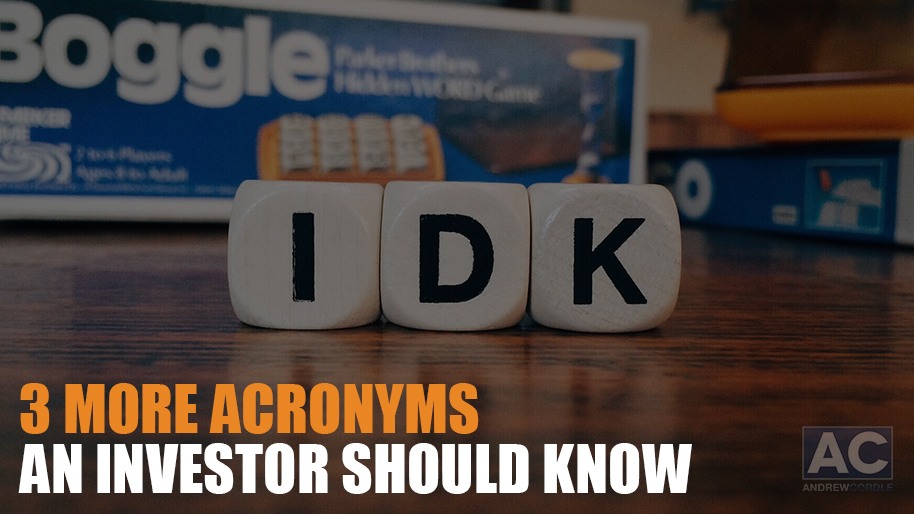When we’re teaching investors how to flip a house, the importance of the kitchen rehab cannot be stressed enough. Kitchens sell homes! In this video, Andrew shows you how to flip a house and rehab that kitchen so the end result is a top-notch, eye-catching product! Our video library helps any investor learn how to flip a house. In today’s video I’ll be discussing: How granite can make a huge difference in your investment! Click here to watch the video. Want to learn more? Click here to check out last week’s post! ...
Read More »

Tenant Screening: Love it or hate it, you need to do it if you don’t want to loose your shirt. This guide will show you everything you need to know, and keep you safe from FHA violations too. Remember, we’re not your lawyer and this is not legal advice. Screening tenants is about making sure you get the best tenants into your properties, by finding out everything there is to know about them. It’s more than just a credit score! Establish your basic requirements What do you want from your tenants? Income: 3x the monthly rent Credit: clear of collections Employment: last 2 years, continuously employed. Landlord references: positive Evictions: never ever ever. If someone has been evicted within the FCRA reportable time frame, you don’t want them. Crimes: No felonies, no sex offenders. Some landlords don’t like misdemeanors or violent misdemeanors. Always make sure to check with your state and local laws regarding arrest records, expunged convictions and the like. Regulation varies widely across locations. Stop the bad tenant before they apply Tenants who don’t meet requirements won’t often apply! Make sure all of your requirements are clearly stated in your Ads (Craigslist, Zillow, Trulia, Offline, Facebook, Apartments.com Rent.com etc) on your application form, and during your phone interviews as well! Remember: Be impartial like a robot: Use an Application Form Communicate Requirements Use them for everyone 3. Start screening your prospective tenants Employment Check: Is the tenant gainfully employed? Can you verify that the company exists? Is the phone number of their supervisor a company land line? Are the W2s legit? Does the company show up on a service like the Work Number? Does the Tenant make enough money to pay your rent, with enough left over for all their other expenses? How long have they been working? Are there large, unexplainable gaps in employment over the past few years? What if the tenant is not employed or their income is insufficient? Your best bet is to reject them. If you can’t or everything else is clear, then you should get a co-signer on the lease. The co signer needs to meet all of the rental criteria themselves. No co signer? You can try a rental guarantee bond, but probably you should just move on. Credit Check: What is the tenant’s credit score? Are there any delinquencies, bankruptcies, collections or other bad marks on the credit report? Does the tenant regularly pay their bills on time? How often do they miss payments? Tenant Rental Verification: What do previous landlords say about the tenant? Were they respectful and meet all of the rules of their previous rentals? Go back as many rentals as possible. The current landlord may lie to you just to get rid of a problem tenant. If...
Read More »

Tenants are the most important investment that any landlord has to make. The thing that separates the successful landlords from the ones who fail is their ability to effectively screen tenants. Most landlords use the standard method of screening, the credit score. This is okay. But when you’re dealing with class C and D properties it is going to be harder to find a tenant with a great credit score. The longer you spend searching the more money you lose. I’m going to provide you with two things to look for on a tenant’s credit application. They will help you avoid losing money from investing in bad tenants and vacancy. Evictions Evictions are tough for both tenants and landlords. The entire process is tiring and normally doesn’t end well for anybody. There are a lot of tenants who I am willing to give a chance to. But when I see an eviction on any tenant application I walk away. Why? When I have to evict a tenant I want the process to be as short and painless as possible. When an eviction shows up on a tenant’s application it is a sign. A sign that their eviction was a more drawn out process. It takes extra effort on the part on the landlord to make sure that an eviction ends up on a tenant’s credit report. That tenant/landlord relationship would have really had to get bad for the landlord to spend the extra time and effort to make sure that the eviction ended up on that report. If you see an eviction on a tenant’s credit report I highly recommend continuing your search for a tenant. Utility/Power Bill Checking out the utility/power bill on a tenant’s credit application is another deal breaker. If I look at a tenant’s credit application and there are collections on a utility it means one of two things. The tenant could have been evicted. I’m left with this being a possible scenario because normally evictions occur when a tenant is unable to pay on time or is unable to pay at all. It’s extremely common that when given the choice between paying a utility and paying rent, the tenant pays the utility bill. If utilities collections show up on a tenant’s credit application, not only did they fail to pay their utilities, chances are there was an eviction also. The second possibility is that the tenant moved out of the house without telling the landlord. No matter what reason, when a tenant leaves without giving any kind of notice to their landlord it ends up being rough for both parties. Without notification the utilities will normally stay on under the tenant’s name until the landlord realizes they are missing a tenant. It is because of these two reasons that when I see collections...
Read More »

Every industry has a lingo. Every profession has a different language that they speak, most of which is done through acronyms. The same goes for a real estate investor. Real estate investors use acronyms all of the time to communicate faster and more efficiently. In today’s post I’m going to cover 3 more acronyms that every real estate investor should know. You can click here to view the previous 3 acronyms that I covered. EM- Earnest Money Your earnest money is basically your down payment. The amount of earnest money you can put down on a house can range anywhere from $10 to the full purchase price of the property. I have actually used $10 for earnest money before, and I’ve also had sellers request specific amounts. It all depends on the situation. I normally always put the earnest money into escrow with the title company. This prevents me from having to rely on a third party to take care of the money. Also, always have an escape clause in your contract to prevent the loss of any funds, should the deal fall through. JV- Joint Venture A joint venture is when you, as a real estate investor, work on a deal with another individual. The other party could be another real estate investor, a builder or just somebody looking to make a quick buck. They don’t even have to live in this country! I’m currently working on hammering out a joint venture between myself and a person in France. Joint ventures are popular in the flipping market because the two parties are only together for one deal. Normally one person will pay for the property and the other is in charge of the demo and construction. There is no set rate of return for each individual. It is whatever is agreed upon when the joint venture is started. EMP EMP stands for electrical, mechanical and plumbing. A successful real estate investor has a great EMP team and strategy. If you don’t have a few licensed electricians, mechanics or handymen, and plumbers in your contacts list then you need to get that team assembled! It won’t only save you time but money as well. Your EMP specialists all require special licensing and typically all work on rehab projects at the exact same time. This makes it easy to get a lot of important work done at the same time, instead of having a “jack of all trades” take three times longer to perform the same amount of work. ...
Read More »











